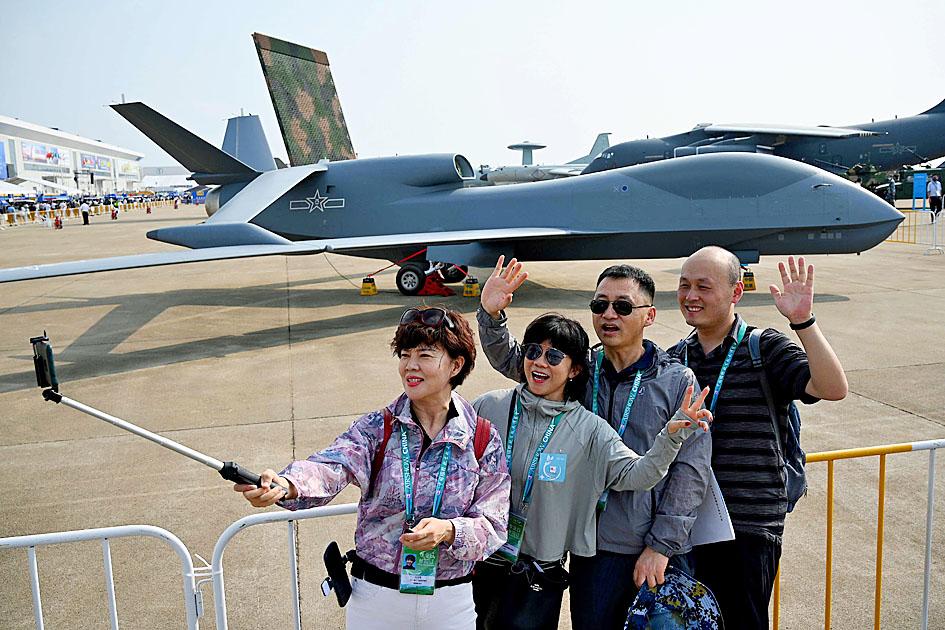China yesterday showed off its increasingly sophisticated air power, including surveillance drones, with an eye on disputed territories from Taiwan to the South China Sea and its rivalry with the US.
The nation’s biggest airshow, in the southern coastal city of Zhuhai, comes as Beijing pushes to meet a 2035 deadline to retool its military for modern warfare.
China still lags the US in terms of technology and investment in its war machine, but experts say it is narrowing the gap.

Photo: AFP
A US intelligence report this year flagged China’s growing influence as one of Washington’s biggest threats.
An air force aerobatic team left colorful vapor trails as it maneuvered in formation, while visitors inspected new jets, drones and attack helicopters on the tarmac.
The CH-6, a prototype drone with a wingspan of 20.5m, was among the domestic technology unveiled.
It is designed for surveillance and can also carry weapons for strike missions, open-source intelligence agency Janes reported.
The drone has a cruising altitude of 10,000m, “but it can go as high as 15,000m,” said Qin Yongming, general manager of drone maker Aerospace CH UAV Co.
“It can fly for longer periods [than previous models] ... it can carry out longer missions, with higher efficiency without any time limits,” Qin said.
Other debutants included the WZ-7 high-altitude drone for border reconnaissance and maritime patrol, as well as the J-16D fighter that has the ability to jam electronic equipment.
Both have already entered service with the air force, state media reported.
“They will play a major role in both the Taiwan Strait and the South China Sea,” military commentator Song Zhongping (宋忠平) said.
Under former US president Donald Trump, Washington authorized about US$18 billion of arms sales to Taiwan, including advanced missile platforms — sales that angered Beijing.
China is also “clearly positioning itself to be an alternative supplier” of advanced drones, with relative affordability, Janes analyst Kelvin Wong (黃加榮) said.
The US and European nations have been hesitant to supply such equipment outside a select group of partners, he said.
Chinese drones have already seen combat action in the Middle East and have been sold to customers in other regions as well.
The J-16D improves the combat capabilities of the People’s Liberation Army, said James Char, a Chinese military expert at Singapore’s Nanyang Technological University.
The jet has wingtip pods to disrupt enemy electronic equipment and has drawn comparisons with the US-made EA-18G Growler.
“It gives the Chinese military an advantage in terms of conducting aerial electronic warfare over targets that possess significant air defense capabilities,” Char said.
The Zhuhai airshow, usually held every two years, was postponed from last year due to the COVID-19 pandemic, and is being staged before a largely domestic audience due to quarantine and travel restrictions.

MAKING WAVES: China’s maritime militia could become a nontraditional threat in war, clogging up shipping lanes to prevent US or Japanese intervention, a report said About 1,900 Chinese ships flying flags of convenience and fishing vessels that participated in China’s military exercises around Taiwan last month and in January last year have been listed for monitoring, Coast Guard Administration (CGA) Deputy Director-General Hsieh Ching-chin (謝慶欽) said yesterday. Following amendments to the Commercial Port Act (商港法) and the Law of Ships (船舶法) last month, the CGA can designate possible berthing areas or deny ports of call for vessels suspected of loitering around areas where undersea cables can be accessed, Oceans Affairs Council Minister Kuan Bi-ling (管碧玲) said. The list of suspected ships, originally 300, had risen to about

DAREDEVIL: Honnold said it had always been a dream of his to climb Taipei 101, while a Netflix producer said the skyscraper was ‘a real icon of this country’ US climber Alex Honnold yesterday took on Taiwan’s tallest building, becoming the first person to scale Taipei 101 without a rope, harness or safety net. Hundreds of spectators gathered at the base of the 101-story skyscraper to watch Honnold, 40, embark on his daredevil feat, which was also broadcast live on Netflix. Dressed in a red T-shirt and yellow custom-made climbing shoes, Honnold swiftly moved up the southeast face of the glass and steel building. At one point, he stepped onto a platform midway up to wave down at fans and onlookers who were taking photos. People watching from inside

Japan’s strategic alliance with the US would collapse if Tokyo were to turn away from a conflict in Taiwan, Japanese Prime Minister Sanae Takaichi said yesterday, but distanced herself from previous comments that suggested a possible military response in such an event. Takaichi expressed her latest views on a nationally broadcast TV program late on Monday, where an opposition party leader criticized her for igniting tensions with China with the earlier remarks. Ties between Japan and China have sunk to the worst level in years after Takaichi said in November that a hypothetical Chinese attack on Taiwan could bring about a Japanese

STREAMLINED: The dedicated funding would allow the US to transfer equipment to Taiwan when needed and order upgraded replacements for stockpiles, a source said The US House of Representatives on Thursday passed a defense appropriations bill totaling US$838.7 billion, of which US$1 billion is to be allocated to reinforcing security cooperation with Taiwan and US$150 million to replace defense articles provided to the nation. These are part of the Consolidated Appropriation Act, which the US House yesterday passed with 341 votes in favor and 88 against. The act must be passed by the US Senate before Friday next week to avoid another government shutdown. The US House Committee on Appropriations on Monday unveiled the act, saying that it allocates US$1 billion for the Taiwan Security Cooperation Initiative